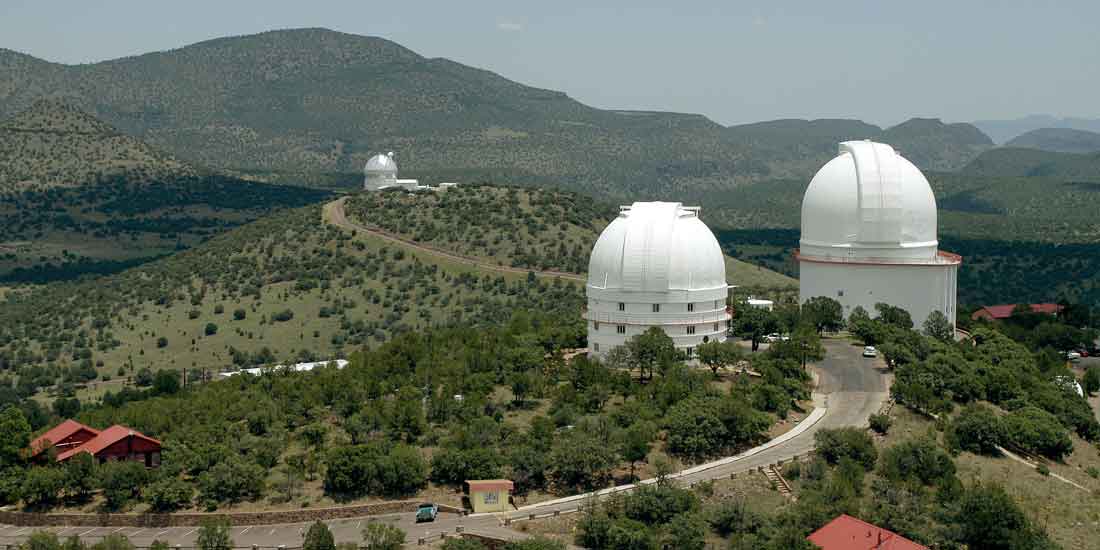
FORT DAVIS & MCDONALD OBSERVATORY
A One-Day to the Northeast from Marfa
Stop 1: Chihuahuan Desert Nature Center and Botanical Gardens
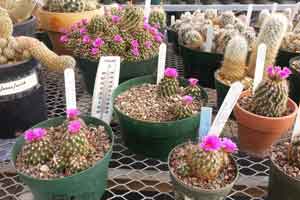
Cactus confusion ends here. Stop by this 507 acre Nature Center and Botanical Gardens by taking a right turn on 118. You’ll gain a better understanding of the Chihuahuan Desert after seeing their 20 acres of botanical and pollinator gardens and a renowned cactus house. Five miles of scenic trails lead to a year-round spring and pools. The knowledgeable staff will do everything possible to answer your questions about the this unique habitat.
The Chihuahuan Desert Research Institute (CDRI) promotes public awareness, appreciation, and concern for the natural diversity of the Chihuahuan Desert region through education and research and its close working relationship with Sul Ross State University. www.cdri.org
Stop 2: Fort Davis National Historic Site
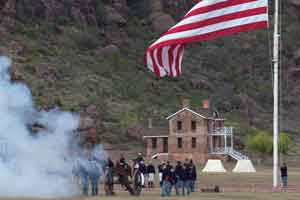
One of the best remaining examples of a frontier military post in the American Southwest is Fort Davis. The restored frontier fort is a vivid reminder of the significant role played by the military in the settlement and development of the western frontier.
Fort Davis was established and grew under the protection of the U.S. Army post of the same name, which was founded in 1854 at the crossroads of the famous Chihuahua Trail and Butterfield Overland Mail Route. The fort protected travelers and the settlers who were developing West Texas, it was home to troops off and on until 1891.
Catch the retreat parade to listen to the bugle calls the soldiers perform in 1875 dress. Presented three times every day at 11 am, 2 pm and 4 pm. Fort Davis National Historic Site
Stop 3: Davis Mountains State Park
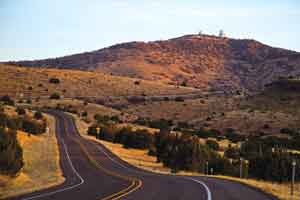
“The Davis Mountains is the one place that stays cool while the rest of the state swelters.” writes Helen Thompson. As she explains, this West Texas range is saved from becoming high and dry like the taller Guadalupe Mountains to the north. The Davis Mountains are have a network of sparkling springs that feed into little creeks. The result is rich riparian habitat, fragrant piñons and cool breezes.
Follow the park’s road to the view point. A trail leads back down to the road.The road to the observatory has a history. When in 1933 the Great Depression devastated the local ranching economy, landowners donated 560 acres for a state park in Keesey Canyon, along the highway toward Mount Locke. The National Park Service then assisted the design and the CCC built inside the park a five-mile scenic road, carved in switchbacks, ascending to the top of the ridge between Hospital and Keesey Canyons. From this ridge, visitors enjoy breathtaking panoramas, including a view of the 19th-century military installation Fort Davis, which lent the adjacent valley town its name, and McDonald Observatory on a mountaintop to the north. Davis Mountains State Park
Stop 4: Indian Lodge
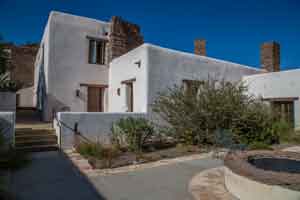
Indian Village is a sixteen-room pueblo-style hotel built by the Civilian Conservation Corp in the 1930s. The pueblo-looking structure is on the north slope of Keesey Canyon, built of hand-hewn pine beams and adobe blocks made onsite. Distinctive features include unique longleaf pine floors, cane and log ceilings, hand-carved cedar furniture and a plaza-like exterior courtyard. The structure and grounds artfully recall the indigenous adobe Native American and Spanish architecture of the Southwest, and incorporates the work of architects J. B. Roberts, Olin Smith, Arthur Fehr, William C. Caldwell, and landscape architect Roy S. Ferguson.
Stop 5: Prude Ranch
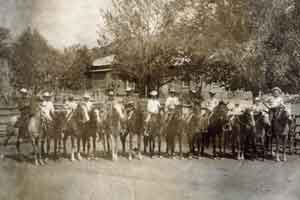
The historic Prude Guest Ranch in Fort Davis combines old west wilderness with modern amenities. When Grandmother Prude came to Fort Davis over 100 years ago with her parents in a covered wagon, the soldiers of Old Fort Davis had to protect them from Indians. Her marriage to Andrew G. Prude in 1896 began the legacy of the present Prude Ranch operation. Since then, six generations of Prudes have successfully operated the ranch as both guest ranch and working cattle ranch for a century. With over 65 well trained, gentle horses to choose from, anyone above the age of six can enjoy a ride in Prude Ranch’s expansive wide-open spaces and scenic mountain ranges to enjoy the pure air and pleasant temperatures. Prude Ranch
Stop 6: McDonald Observatory
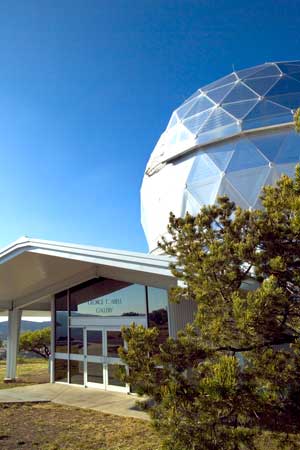
Head on up the hill to visit the darkest observatory in North America.The McDonald Observatory was originally endowed by the Texas banker William Johnson McDonald (1844–1926), who left about $1,000,000 to endow an astronomical observatory. The provision of the will was challenged by McDonald's relatives, but after a long legal fight, the University received about $800,000 from the estate and construction began at Mt. Locke. The then-unnamed Otto Struve Telescope was dedicated on May 5, 1939, and at that time was the second largest telescope in the world.
The McDonald Observatory is equipped with a wide range of instrumentation for imaging and spectroscopy in the optical and infrared spectra, and operates the first lunar laser ranging station. It works closely with the astronomy department of the University of Texas at Austin while maintaining administrative autonomy. It is a good idea to prepurchase a Daytime Pass which lets you inside the Visitors Center’s Decoding Starlight exhibit and into a Solar Viewing Program (typically 45-50 minutes), a theater featuring live (weather dependent) telescope images of the Sun—sunspots, prominences, and flares—daily at 11 a.m. and 2 p.m. 100-minute tours available to see the large research telescopes immediately following the Solar Viewings. McDonald Observatory
Rock Structures
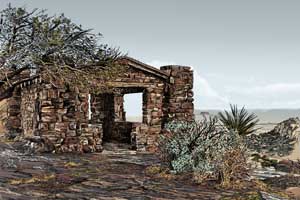

Black-tailed jackrabbits
Black-tailed jackrabbits are found throughout west Texas, Most active from evening to late morning, and can commonly be seen along the roadsides on summer nights. Use caution at all times when driving because the jackrabbits flee in a zigzag pattern, making their retreat path often unguessable.


